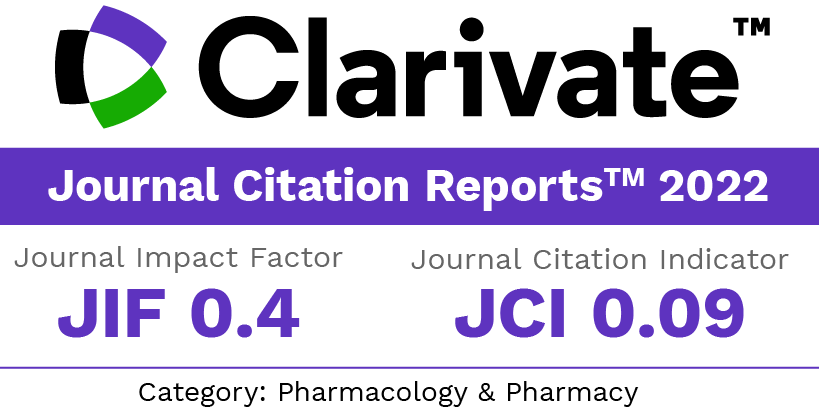Adherencia terapéutica: factores modificadores y estrategias de mejora
DOI:
https://doi.org/10.30827/ars.v59i4.7357Palabras clave:
adherencia al tratamiento, factores, estrategiasResumen
Objetivos: Describir los factores que pueden influir en la adherencia a los tratamientos farmacológicos y las intervenciones que han sido desarrolladas para su mejora.
Métodos: Se realizó una búsqueda de los artículos de investigación más importantes publicados sobre el tema en la base de datos National Library of Medicine, Washington, DC (MEDLINE: PubMed).
Resultados: La adherencia al tratamiento es un comportamiento complejo influenciado por múltiples factores: socioeconómicos, relacionados con el sistema sanitario, con el tratamiento, con la patología o con el paciente. En cuanto a las intervenciones, principalmente pueden diferenciarse en intervenciones de tipo técnico, intervenciones conductuales o intervenciones educativas. Ninguna de las intervenciones estudiada hasta la fecha ha demostrado ser efectiva de forma universal y permanente.
Conclusiones: La adherencia terapéutica es un comportamiento dinámico influenciado por una gran variedad de factores y, por ello, las estrategias para mejorarla deberán individualizarse para cada paciente.
Descargas
Citas
Haynes RB. Determinants of compliance: The disease and the mechanics of treatment. Baltimore MD: Johns Hopkins University Press; 1979.
Sabaté E. Adherence to long-term therapies: evidence for action. Switzerland: World Health Organisation; 2003.
Ibrahim AR, Eliasson L, Apperley JF, Milojkovic D, Bua M, Szydlo R, et al. Poor adherence is the main reason for loss of CCyR and imatinib failure for chronic myeloid leukemia patients on long-term therapy. Blood. 2011;117(14):3733–6.
Noens L, van Lierde M-A, De Bock R, Verhoef G, Zachee P, Berneman Z, et al. Prevalence, determinants, and outcomes of nonadherence to imatinib therapy in patients with chronic myeloid leukemia: the ADAGIO study. Blood. 2009;113(22):5401–11.
Darkow T, Henk HJ, Thomas SK, Feng W, Baladi J-F, Goldberg GA, et al. Treatment interruptions and non-adherence with imatinib and associated healthcare costs: a retrospective analysis among managed care patients with chronic myelogenous leukaemia. Pharmacoeconomics. 2007;25(6):481–96.
Sokol MC, McGuigan KA, Verbrugge RR, Epstein RS. Impact of medication adherence on hospitalization risk and healthcare cost. Med Care. 2005;43(6):521–30.
Simpson SH. A meta-analysis of the association between adherence to drug therapy and mortality. BMJ. 2006;333(7557):15.
Jackevicius CA, Li P, Tu J V. Prevalence, predictors, and outcomes of primary nonadherence after acute myocardial infarction. Circulation. 2008;117(8):1028–36.
Morisky DE, Green LW, Levine DM. Concurrent and predictive validity of a self-reported measure of medication adherence. Med Care. 1986;24(1):67-74.
Piñeiro-Abad A, Mera-Gallego R, Andrés-Iglesias JC, Fornos-Pérez JA, Vérez-Cotelo N, Andrés-Rodríguez NF. Análisis del rechazo de dispensaciones en receta electrónica y la relación con el incumplimiento. Pharm Care Esp. 2018;20(4): 247-268.
Munro SA, Lewin SA, Smith HJ, Engel ME, Fretheim A, Volmink J. Patient Adherence to Tuberculosis Treatment: A Systematic Review of Qualitative Research. Rylko-Bauer B, editor. PLoS Med. 2007;4(7):e238.
Costello K, Kennedy P, Scanzillo J. Recognizing nonadherence in patients with multiple sclerosis and maintaining treatment adherence in the long term. Medscape J Med. 2008;10(9):225.
Oehl M, Hummer M, Fleischhacker WW. Compliance with antipsychotic treatment. Acta Psychiatr Scand Suppl. 2000;(407):83–6.
Mills EJ, Nachega JB, Bangsberg DR, Singh S, Rachlis B, Wu P, et al. Adherence to HAART: A Systematic Review of Developed and Developing Nation Patient-Reported Barriers and Facilitators. Attaran A, editor. PLoS Med. 2006;3(11):e438.
Lanouette N, Folsom D, Sciolla A, Jeste D. Psychotropic Medication Nonadherence Among United States Latinos: A Comprehensive Literature Review. Psychiatr Serv. 2009;60(2):157–74.
DiMatteo MR. Variations in patients’ adherence to medical recommendations: a quantitative review of 50 years of research. Med Care. 2004;42(3):200–9.
Hodari KT, Nanton JR, Carroll CL, Feldman SR, Balkrishnan R. Adherence in dermatology: a review of the last 20 years. J Dermatolog Treat. 2006;17(3):136–42.
Vermeire E, Hearnshaw H, Van Royen P, Denekens J. Patient adherence to treatment: three decades of research. A comprehensive review. J Clin Pharm Ther. 2001;26(5):331–42.
Kardas P, Lewek P, Matyjaszczyk M. Determinants of patient adherence: A review of systematic reviews. Front Pharmacol. 2013;4:1–16.
Iskedjian M, Einarson TR, MacKeigan LD, Shear N, Addis A, Mittmann N, et al. Relationship between daily dose frequency and adherence to antihypertensive pharmacotherapy: evidence from a meta-analysis. Clin Ther. 2002;24(2):302–16.
Charach A, Gajaria A. Improving psychostimulant adherence in children with ADHD. Expert Rev Neurother. 2008;8(10):1563–71.
Connor J, Rafter N, Rodgers A. Do fixed-dose combination pills or unit-of-use packaging improve adherence? A systematic review. Bull World Health Organ. 2004;82(12):935–9.
Broekmans S, Dobbels F, Milisen K, Morlion B, Vanderschueren S. Medication adherence in patients with chronic non-malignant pain: Is there a problem? Eur J Pain. 2009;13(2):115–23.
Vik SA, Maxwell CJ, Hogan DB. Measurement, correlates, and health outcomes of medication adherence among seniors. Ann Pharmacother. 2004;38(2):303–12.
Reisner SL, Mimiaga MJ, Skeer M, Perkovich B, Johnson C V, Safren SA. A review of HIV antiretroviral adherence and intervention studies among HIV-infected youth. Top HIV Med.2009;17(1):14–25.
Olthoff CMG, Schouten JSAG, van de Borne BW, Webers CAB. Noncompliance with ocular hypotensive treatment in patients with glaucoma or ocular hypertension an evidence-based review. Ophthalmology. 2005;112(6):953–61.
Gold DT, Alexander IM, Ettinger MP. How Can Osteoporosis Patients Benefit More from Their Therapy? Adherence Issues with Bisphosphonate Therapy. Ann Pharmacother. 2006;40(6):1143–50.
Nosé M, Barbui C, Tansella M. How often do patients with psychosis fail to adhere to treatment programmes? A systematic review. Psychol Med. 2003;33(7):1149–60.
Fogarty L, Roter D, Larson S, Burke J, Gillespie J, Levy R. Patient adherence to HIV medication regimens: a review of published and abstract reports. Patient Educ Couns. 2002;46(2):93–108.
Schmid H, Hartmann B, Schiffl H. Adherence to prescribed oral medication in adult patients undergoing chronic hemodialysis: a critical review of the literature. Eur J Med Res. 2009;14(5):185–90.
Vreeman RC, Wiehe SE, Pearce EC, Nyandiko WM. A Systematic Review of Pediatric Adherence to Antiretroviral Therapy in Low- and Middle-Income Countries. Pediatr Infect Dis J. 2008;27(8):686–91.
Weiner JR, Toy EL, Sacco P, Duh MS. Costs, quality of life and treatment compliance associated with antibiotic therapies in patients with cystic fibrosis: a review of the literature. Expert Opin Pharmacother. 2008;9(5):751–66.
Munro S, Lewin S, Swart T, Volmink J. A review of health behaviour theories: how useful are these for developing interventions to promote long-term medication adherence for TB and HIV/AIDS? BMC Public Health. 2007;7(1):104.
González-Bueno J, Vega-Coca MD, Rodríguez-Pérez A, Toscano-Guzmán MD, Pérez-Guerrero C, Santos-Ramos B. Intervenciones para la mejora de la adherencia al tratamiento en pacientes pluripatológicos: resumen de revisiones sistemáticas. Atención Primaria. 2016;48(2):121–30.
Osterberg L, Blaschke T. Adherence to medication. N Engl J Med. 2005;353(5):487–97.
Kripalani S, Yao X, Haynes RB. Interventions to enhance medication adherence in chronic medical conditions: a systematic review. Arch Intern Med. 2007;167(6):540–50.
Demonceau J, Ruppar T, Kristanto P, Hughes DA, Fargher E, Kardas P, et al. Identification and Assessment of Adherence-Enhancing Interventions in Studies Assessing Medication Adherence Through Electronically Compiled Drug Dosing Histories: A Systematic Literature Review and Meta-Analysis. Drugs. 2013;73(6):545–62.
Richter A, Anton SF, Anton SE, Koch P, Dennett SL. The impact of reducing dose frequency on health outcomes. Clin Ther. 2003;25(8):2307–35; discussion 2306.
Saini SD, Schoenfeld P, Kaulback K, Dubinsky MC. Effect of medication dosing frequency on adherence in chronic diseases. Am J Manag Care. 2009;15(6):e22-33.
Coleman CI, Limone B, Sobieraj DM, Lee S, Roberts MS, Kaur R, et al. Dosing Frequency and Medication Adherence in Chronic Disease. J Manag Care Pharm. 2012;18(7):527–39.
Shellmer DA, Dew MA, Mazariegos G, DeVito Dabbs A. Development and field testing of Teen Pocket PATH ® , a mobile health application to improve medication adherence in adolescent solid organ recipients. Pediatr Transplant. 2016;20(1):130–40.
Sarzynski E, Decker B, Thul A, Weismantel D, Melaragni R, Cholakis E, et al. Beta Testing a Novel Smartphone Application to Improve Medication Adherence. Telemed J E Heal. 2017;23(4):339-348
Kassahun A, Gashe F, Mulisa E, Rike W. Nonadherence and factors affecting adherence of diabetic patients to anti-diabetic medication in Assela General Hospital, Oromia Region, Ethiopia. J Pharm Bioallied Sci. 2016;8(2):124.
Vaala SE, Hood KK, Laffel L, Kumah-Crystal YA, Lybarger CK, Mulvaney SA. Use of Commonly Available Technologies for Diabetes Information and Self-Management Among Adolescents With Type 1 Diabetes and Their Parents: A Web-Based Survey Study. Interact J Med Res. 2015;4(4):e24.
Brown SA. Studies of educational interventions and outcomes in diabetic adults: a meta-analysis revisited. Patient Educ Couns. 1990;16(3):189–215.
Devine EC, Reifschneider E. A meta-analysis of the effects of psychoeducational care in adults with hypertension. Nurs Res. 1995;44(4):237–45.
Devine EC, Pearcy J. Meta-analysis of the effects of psychoeducational care in adults with chronic obstructive pulmonary disease. Patient Educ Couns. 1996;29(2):167–78.
Devine EC. Meta-analysis of the effects of psychoeducational care in adults with asthma. Res Nurs Health. 1996;19(5):367–76.
González-Mestre A. Programa Pacient Expert Catalunya®: una estratègia per potenciar l’autorresponsabilitat del pacient i el foment de l’autocura [Internet]. 2015. Available from: http://canalsalut.gencat.cat/ca/sistema-de-salut/participacio/pacient_expert/
Tercer Consenso de Granada sobre Problemas Relacionados con Medicamentos (PRM) y Resultados Negativos asociados a la Medicación (RNM). Ars Pharm. 2007;48(1):5–17.
Faus Dáder MJ, Amariles Muñoz P, Martinez-Martinez F et al. Atención farmacéutica servicios farmacéuticos orientados al paciente. ISBN: 978-84-16992-59-1. Depósito Legal: GR 90-2018. (2018)
Horne R, Chapman SC, Parham R, Freemantle N, Forbes A, Cooper V. Understanding patients’ adherence-related beliefs about medicines prescribed for long-term conditions: a meta-analytic review of the Necessity-Concerns Framework. PLoS One. 2013;8(12):e80633.
Carpenter CJ. A meta-analysis of the effectiveness of health belief model variables in predicting behavior. Health Commun. 2010;25(8):661-9.
DiMatteo MR, Haskard-Zolnierek KB, Martin LR. Improving patient adherence: a three-factor model to guide practice. Health Psychology Review 2012;6(1): 74-91.
Prochaska JO, Velicer WF. The transtheoretical model of health behavior change. Am J Health Promot. 1997;12(1):38-48.
Motivational interviewing: research, practice, and puzzles. Addict Behav. 1996;21(6):835-42.
Publicado
Cómo citar
Número
Sección
Licencia
Derechos de autor 2018 Neus Pagès-Puigdemont, M Isabel Valverde-Merino

Esta obra está bajo una licencia internacional Creative Commons Atribución-NoComercial-CompartirIgual 4.0.
Los artículos que se publican en esta revista están sujetos a los siguientes términos en relación a los derechos patrimoniales o de explotación:
- Los autores/as conservarán sus derechos de autor y garantizarán a la revista el derecho de primera publicación de su obra, la cual se distribuirá con una licencia Creative Commons BY-NC-SA 4.0 que permite a terceros reutilizar la obra siempre que se indique su autor, se cite la fuente original y no se haga un uso comercial de la misma.
- Los autores/as podrán adoptar otros acuerdos de licencia no exclusiva de distribución de la versión de la obra publicada (p. ej.: depositarla en un archivo telemático institucional o publicarla en un volumen monográfico) siempre que se indique la fuente original de su publicación.
- Se permite y recomienda a los autores/as difundir su obra a través de Internet (p. ej.: en repositorios institucionales o en su página web) antes y durante el proceso de envío, lo cual puede producir intercambios interesantes y aumentar las citas de la obra publicada. (Véase El efecto del acceso abierto).
























